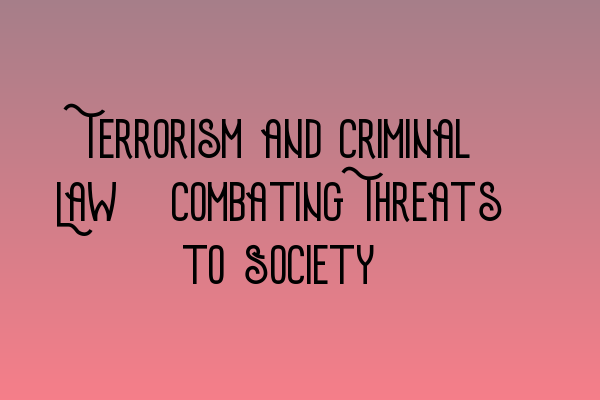Terrorism and Criminal Law: Combating Threats to Society
Terrorism is a grave threat to society, and the criminal law plays a crucial role in combatting such acts of violence and ensuring the safety and security of the public. In this blog post, we will explore the intersection of terrorism and criminal law, highlighting the measures taken to prevent, investigate, and prosecute individuals involved in terrorist activities.
The Definition of Terrorism
Before delving into the intricacies of the criminal law’s approach to terrorism, it is essential to understand the definition of terrorism itself. Terrorism can be broadly defined as the use of violence, intimidation, or coercion for political, ideological, or religious purposes. The acts committed by terrorists pose a significant risk to public safety and disrupt the social fabric of nations.
In order to effectively combat terrorism, it is necessary to establish comprehensive legal frameworks that address its unique challenges. Criminal laws governing terrorist activities are designed to provide the authorities with the necessary powers to detect, prevent, and respond to acts of terrorism.
The Role of Criminal Law in Combating Terrorism
Criminal law plays a fundamental role in combatting terrorism through various mechanisms:
1. Investigation: Effective investigation techniques are crucial in identifying individuals involved in terrorist activities. Law enforcement agencies are empowered to gather intelligence, conduct surveillance operations, and gather evidence to support the prosecution of suspected terrorists.
2. Prosecution: The criminal justice system plays a critical role in bringing terrorists to justice. Prosecution involves presenting evidence, conducting trials, and securing convictions. This process requires adherence to the principles of due process and the rights of the accused.
3. International Cooperation: Terrorism is a global phenomenon that requires international cooperation to combat effectively. Countries cooperate through extradition treaties, intelligence sharing, and joint investigations to apprehend terrorists and dismantle their networks.
Preventative Measures
Preventing acts of terrorism is a key objective of criminal law. Governments and law enforcement agencies employ various strategies to prevent attacks and disrupt terrorist networks:
1. Intelligence Gathering: Gathering actionable intelligence is essential in preventing acts of terrorism. Intelligence agencies work closely with domestic and international partners to collect, analyze, and act upon intelligence that foils terrorist plots.
2. Border Control: Effectively managing borders is crucial in preventing the movement of terrorists and their equipment across international boundaries. Strengthening border control measures, enhancing surveillance technologies, and implementing rigorous immigration processes help detect and apprehend suspected terrorists.
3. Public Awareness: Raising public awareness about the signs of radicalization and the importance of reporting suspicious activities contribute to the prevention of terrorist attacks. Engaging communities, educating individuals about the risks of extremism, and promoting dialogue can help identify and disrupt potential threats.
Legislation and Counter-Terrorism Laws
Legislation plays a crucial role in providing the legal framework within which law enforcement agencies can combat terrorism. Counter-terrorism laws grant authorities the necessary powers to investigate, detect, and prosecute individuals involved in terrorist activities. Some key legislation and measures include:
1. Anti-Terrorism Acts: Governments enact anti-terrorism acts to provide law enforcement agencies with the tools they need to combat terrorism effectively. These acts often include provisions for enhanced surveillance, detention without charge, and the prosecution of offenses related to terrorist activities.
2. Asset Freezing and Financial Measures: Disrupting the financial networks that support terrorist activities is crucial in combatting terrorism. Laws allowing the freezing of assets, seizing funds, and monitoring suspicious financial transactions help prevent the financing of terrorist operations.
3. Intelligence Sharing: Sharing intelligence and information among domestic and international law enforcement agencies is vital in combatting terrorism. Legislation facilitates the exchange of intelligence, ensuring that relevant agencies have access to critical information to detect and prevent terrorist activities.
Conclusion
Tackling terrorism requires a comprehensive and coordinated approach that involves not only law enforcement agencies but society as a whole. The criminal law provides the legal framework to address the unique challenges posed by terrorism and plays a vital role in ensuring the safety and security of individuals and communities.
For more information on criminal law and preparation for legal exams, take a look at our related articles:
SQE 1 Practice Mocks FLK1 FLK2
Thank you for reading!
